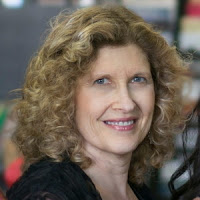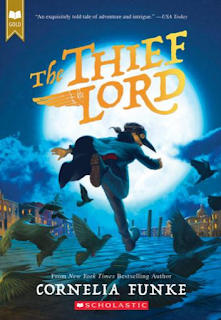Translator and agent Oliver Latsch grew up bilingual in German and English in East Africa and Germany. He trained to be a scientist and had just completed his PhD in Biology in the U.K. when he was asked to help get some best-selling German children’s books published in English. This led to a career as a literary agent and translator. Since then, he has accumulated 17 published book translations both from German to English and vice versa. His translation of Cornelia Funke's The Thief Lord from German into English was shortlisted for the 2003 Mildred L. Batchelder Award for an outstanding translated book and his most recent translations include The Magicians Map by Mikki Lish and Kelly Ngai (into German) , The Silver Tracks (Mirrorworld 4) by Cornelia Funke, Robin Hood and Erik the Red by Tilman Röhrig, and Save Our Freedom: A Wake-Up Call in Digital Times by Bijan Moini (into English).
Nanette McGuinness: How did you come to translate and represent Cornelia Funke's books?
Oliver Latsch: The Cliff Notes version: I am Cornelia’s cousin. She was always like an older sister to me, since she often looked after my brother and me, starting when I was six, when she moved to our city to go to college. While I grew up and went to university in the U.K., Cornelia became a successful writer. After I had finished my PhD, she asked me to help her fulfill one of her big ambitions: to see her books in English, which was the language of her favorite children’s books. She had always admired J.R.R. Tolkien, C.S. Lewis, T.H. White, and others, and she just wanted to see her books on a bookstore shelf next to these giants. That was it: it wasn’t about more success or more money. I ventured out and went to book fairs and visited publishers and got lots and lots of rejections. I realized I wouldn’t get anywhere until I had full translations, so I translated two of Cornelia’s novels. That way we finally found (or were found by) publisher Barry Cunningham. He published the books in the U.K. and through his partners at Scholastic, in the U.S. So Cornelia did indeed find her books next to Lewis and White and Tolkien and our lives changed in ways neither of us could have anticipated.
NM: How did you become a translator? Do you prefer translating children's literature to grownup literature?
OL: My start as a translator was an accidental one. When I found that the main hurdle to helping Cornelia get her books published in English was (and still is) that publishers really prefer reading the entire book in translation before they can consider it for publication), I took her then-most promising books, The Thief Lord and Dragon Rider, and translated both into English. The idea was to give publishers a notion of the wonderful stories and characters so they would acquire the rights. Then they could have a “proper” translator work on them. When we finally managed to have them published by The Chicken House and Scholastic, they actually used my translation of The Thief Lord and had me work with Anthea Bell to polish up my translation of Dragon Rider. That, of course, was a dream entry into professional translation!
By now, I'm comfortable translating almost any genre and age group. Children’s literature is more fun and whimsical (if it’s well written!), but the challenges of grownup fiction or nonfiction are also fun to tackle!
NM: Your Cornelia Funke translations—including Pirate Pig, among many—show a wonderful ear for word play, authorial voice, sentence rhythm and sound. How do you go about rendering such tricky things cross-linguistically? What is your process or does it differ for each book?
OL: Having known Cornelia for such a long time and having read all her books and, most importantly, having heard her read from her books many, many times, I do think I had special access to her tone and her intent, especially for her younger books such as Pirate Pig. That gave me the insight and also the confidence to take a few liberties with the translation so as to get the same fun tone as the German text had. It also taught me that it’s vital to try and have a personal conversation with the author before translating their words. When you’re translating, you always have a myriad of choices to weigh—words, sentence structure, and much more–that by themselves or in aggregate over the length of a novel can have a big impact on how the reader perceives the tone and voice of the author and the characters. So it’s helpful to know what the author sounds like in real life. When I can’t speak to the author, I will try to read interviews and articles by them to give me an impression. For example: is that person very earnest and serious, or more tongue-in-cheek? That way I can gauge their prose accordingly and translate it so that it is closer to the way it was perceived in the author’s mind.
NM: You're both a translator and an agent, which must be quite a juggle? Have you always done both or did one come first? How do you balance these two challenging professions—and has the balance shifted during your career? Is one your "favorite child?"
OL: I was asked to be an agent first… Well, I didn’t even know that was what it was called. But I quickly discovered that having a complete translation is key to making the process easier or even work at all. So really, I’d say agenting and translating went hand in hand. Later I did more of the agenting and management work, because some of the books became so successful that I was busy helping look after the global rights and author appearances and everything that came with working with a suddenly successful author. In recent years, I have tried to do more translations again. The process is such a wonderful linguistic deep-dive and I wouldn’t want to miss it. Sadly, translating doesn’t pay very well, so I do have to keep my agenting side active as well!
NM: You've mentioned that translator Anthea Bell was both a friend and a mentor, which is amazing and fortunate, as she was truly a giant in the field. Can you tell us about her and how you met her? What was it like working with her and having her as a mentor?
OL: Anthea was and still is a legend. Her translations of such wide-ranging works as The Trial, by Kafka, and the Asterix and Obelix comics are still the best! Anthea was brought on by Barry Cunningham to bang my translation of Cornelia’s Dragon Rider into publishable shape. That process was awe-inspiring. Anthea was the most gracious person. Always kind and polite and humble, and always encouraging. She also had my translation of The Thief Lord shortlisted for the Marsh Award. Being told about that is still one of the big highlights of my life. Anthea was a true Renaissance woman with knowledge in almost any field of human endeavor. So interested in everything!
NM: What is the scene in German children's literature today and are there differences between the German- and English-language children's literature market?
OL: Ah … how to answer that question without ruffling feathers or denting egos on either side? When I first started working in both language markets, I was struck by how much more advanced the craft seemed, especially in the U.S., compared to Germany. I always thought it had to do with the fact that writing is perceived more as a craft here, and so authors will share their work and critique it, and they will go out and attend writer retreats or college courses on writing. In Germany, writing was traditionally considered something you couldn’t learn but as a talent you were gifted with. There’s a Carl Spitzweg painting of the suffering poet all alone in his leaky and cold attic that, to me, always captured that. This is changing a lot now. I do sense that young German authors are much more open to other influences and to critique. There is so much brilliant literature for children and young adults coming out in Germany that I hope we can break more cracks into that almost impenetrable wall surrounding the English-language markets. Here’s to staying ever hopeful!
NM: What advice or suggestions, if any, would you give aspiring authors who submit to your--or any agency? Are you open to pitches for books in translation as well as books originally written in English?
OL: I think the first thing I’d tell anyone is: show us, don’t tell us! I really should make that the motto of our agency. We get so many manuscripts of authors that are so enthralled by the world they’re creating (especially when they’re writing science fiction or fantasy) that they simply can’t imagine we wouldn’t be in awe of the sheer scope of their world and its history. Stories are still primarily about characters. Bring me characters that are worth knowing and following. They don’t need to be good people. They can also be bad, or badass. They just have to be interesting. Those characters need to go through something, and the reader absolutely has to know whether they get there, and how. Make us feel what they’re feeling. Start there. Everything else is icing. A good story needs to have good characters with relatable problems first. Whether all that happens in the past or the future or in space or in some fantasy world is just icing. Never start with the concept of your world. Always start with the characters.
And there ends my rant!
All that said, yes, I’m open for pitches on anything and either language. Just give me a good story! Grab my attention. Please!
NM: What current projects (either translating or agenting) are you excited about--if you can share that with our readers?
OL: Nooo … I’m not telling. I may not be superstitious, but I’d still rather not jinx anything, just in case! I can say that I am excited about having taken on some nonfiction projects recently. It’s a refreshing change of pace and perspective—a great balance to constantly having your heartstrings pulled by fictional stories!
NM: Thank you so much for joining us! To all those reading this interview, please (please!) only pitch your very best work that you think will be a good fit for LatschLit Literary Agency after carefully considering what is on their website—whether you send a translation or an original work in English.
 Award-winning opera singer Nanette McGuinness is the translator of over 80 books and graphic novels for children and adults from French, Italian, German and Spanish into English, including the much loved Geronimo Stilton Graphic Novels. Two of her translations, Luisa: Now and Then and California Dreamin’: Cass Elliot Before the Mamas & the Papas were chosen for YALSA’s Great Graphic Novels for Teens; Luisa: Now and Then was also a 2019 Stonewall Honor Book. Recent translations include Makhno: Ukrainian Freedom Fighter); Rosa Parks; Magical History Tour: Vikings, Tiitanic, Gandhi, and The Plague, Bibi & Miyu #2, LGBTQ YA manga Alter Ego and Sirius, and the critically acclaimed A House Without Windows.
Award-winning opera singer Nanette McGuinness is the translator of over 80 books and graphic novels for children and adults from French, Italian, German and Spanish into English, including the much loved Geronimo Stilton Graphic Novels. Two of her translations, Luisa: Now and Then and California Dreamin’: Cass Elliot Before the Mamas & the Papas were chosen for YALSA’s Great Graphic Novels for Teens; Luisa: Now and Then was also a 2019 Stonewall Honor Book. Recent translations include Makhno: Ukrainian Freedom Fighter); Rosa Parks; Magical History Tour: Vikings, Tiitanic, Gandhi, and The Plague, Bibi & Miyu #2, LGBTQ YA manga Alter Ego and Sirius, and the critically acclaimed A House Without Windows.





No comments:
Post a Comment